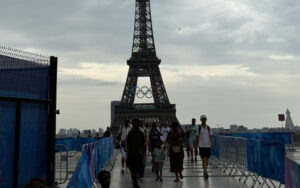
Trisha Ghosal in Paris
In the enchanting land of Paris, a city where every corner whispers verses of poetry, the greatest sacrifice in sports was quietly made. Paris, with its romantic boulevards, iconic Eiffel Tower, and history etched in art and revolution, is a city where the heartstrings of love and ambition are eternally entwined. But in the summer of 2024, Paris was not just the city of lights and love—it was the battleground where dreams collided, heroes were forged, and the great sacrifice of sports was made.
As the world gathered in this timeless city for the Olympic Games, athletes from every corner of the globe arrived not just with hopes of victory, but with hearts brimming with the spirit of sacrifice. You see, every Olympic journey is a tale of sacrifice. The hours spent in lonely training, the bruises and injuries carried like invisible badges of honour, and the sacrifices of time away from loved ones—all these were the verses in the poetry of sports that Paris would immortalise.
In the great coliseums of competition, under the watchful eyes of the world, the athletes became poets in their own right. Their bodies were their pens, the field, track, and water their parchment, and every leap, sprint, and stroke was a line in the epic poem of the Games. Paris, the land of poetry, became the canvas for their verses, a place where sweat and tears mingled with the Seine, where victory was written in the golden hue of medals, and where defeat was etched in the silent resolve of those who fell short, but rose higher in spirit.
Take, for instance, Neeraj Chopra, India’s golden boy, who entered the arena with the weight of a nation’s expectations on his shoulders. Neeraj, whose javelin had previously touched the heavens and brought home gold, now stood poised to write another verse. But in Paris, the pen of fate scribbled a different outcome—silver, not gold. And yet, in this silver, there was a gleam of gold that was unseen by the naked eye, visible only to those who understood the true essence of sportsmanship.
For the Latest Sports News: Click Here

Neeraj’s story in Paris wasn’t just about winning or losing; it was about the grace with which he accepted his fate. In a world obsessed with gold, Neeraj’s silver was a testament to his humility and the quiet dignity that is often lost in the cacophony of triumph. Here was a man who understood that the true victory lay not in the colour of the medal, but in the way he carried himself through the storm of competition. Paris, the city that knows a thing or two about revolutions, witnessed a different kind of revolution in Neeraj—a revolution of the soul.
And so, the poetry of sports was written not just in the victories, but in the sacrifices, the near-misses, and the quiet moments of reflection. Paris, the land of poetry, became the land where the greatest sacrifice of sports was made—not in the giving up of medals, but in the letting go of the need for them. The true champions were those who left behind a piece of their soul on the fields, tracks, and waters of Paris.
In the end, when the lights dimmed and the crowds dispersed, what remained in Paris was not just the memory of who won or lost, but the indelible verses of sacrifice, humility, and the unquenchable human spirit. These were the lines that would echo through the streets of Paris long after the final medal was awarded, a reminder that in the great sacrifice of sports, true poetry was written. And it was beautiful.
Also Read: From Paris to Kolkata: A Louvre Experience, Reminiscent of Durga Puja Crowds





